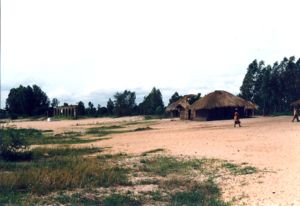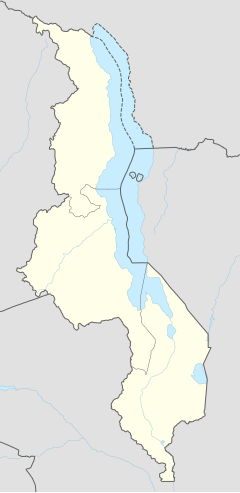Nkhotakota
| Nkhotakota | |
|---|---|

Traditional mud and thatch houses on the beach of Lake Malawi in Nkhotakota
|
|
| Location in Malawi | |
| Coordinates: 12°55′00″S 34°18′00″E / 12.91667°S 34.30000°ECoordinates: 12°55′00″S 34°18′00″E / 12.91667°S 34.30000°E | |
| Country |
|
| Region | Central Region |
| District | Nkhotakota District |
| Elevation | 1,548 ft (472 m) |
| Population (2008) | |
| • Total | 33,150 |
| • Languages | Chichewa |
| Time zone | +2 |
| Climate | Aw |
Nkhotakota (formerly Kota Kota) (name derived from the Chichewa for "Corner Corner") is a town and one of the districts in the Central Region of Malawi. It is on the shore of Lake Malawi (formerly Lake Nyasa) and is one of the main ports on Lake Malawi. As of 2008, Nkhotakota had a population estimated at 33,150. The district had a population of 301.000.
Nkhotakota was originally a group of villages in the 19th century which later served as a market for Swahili-Arabian slave traders.David Livingstone convinced Chief Jumbe to stop trading slaves under a tree in Nkhotakota in the 19th century, which is currently in existence under a mission. Later Malawi president Hastings Banda gave speeches under another tree in Nkhotakota during the 1960s, this one ironically known as the Livingstone Tree. This town was hit by the 2001 floods, and was the worst hit area of Malawi's Central region. Today, Nkhotakota is the largest traditional African town in Malawi and bears a strong Swahili-Arab influence.
Nkhotakota lies at an elevation of 1,548 feet (472 m) on the shore of Lake Malawi. It is located on a rocky ridge overlooking a natural harbour overlooking Nkhotakota Bay, formed by a sandbar. In addition, Nkhotakota is 200 kilometres (120 mi) from Lilongwe, Malawi's capital, and 378 kilometres (235 mi) from Blantyre, Malawi's largest city.
Nkhotakota is home to the Nkhotakota Wildlife Reserve, where, according to Lonely Planet, one has a good chance of seeing elephants. The reserve is also home to several antelope species, buffalo, and leopards. Several large rivers cross this reserve, the largest in Malawi.
Roughly 24 kilometres (15 mi) south of Nkhotakota is the Chia Lagoon, a large bay linked to Lake Malawi by a narrow channel, crossed by a bridge near Nkhotakota's one major road.
The biggest formal 'private' employer in the districts is a sugar manufacturing company "Dwangwa Sugar corporation" (currently under Illovo). Most Locals are small holder farmers of Rice, Cassava and maize, while many others are small scale fishermen, who regularly fish along Lake Malawi, Chia Lagoon and many other rivers including; Bua, Dwangwa,Dwambazi and Chilua, using triangular nets on poles, hooks, etc. Another notable antiquity (tourist attraction) in Nkhotakota is the Mawira hot springs, an area of about 3km2 of hot water that continuously gushes from the ground since time immemorial. Mawira hot springs is situated at the central area of the district, 5 km + – from the Ntchisi/Kasungu road junction. Sungu Island (made of sand and rocks) is another fascinating place to visit in Nkhotakota central. This Island is situated inside the Lake Malawi, 1.5 km from the shores, and approximately 2 km from Kaliba station (dock), where passenger boats cruising along the lake Malawi picks or drops passengers and small scale traders.
...
Wikipedia

